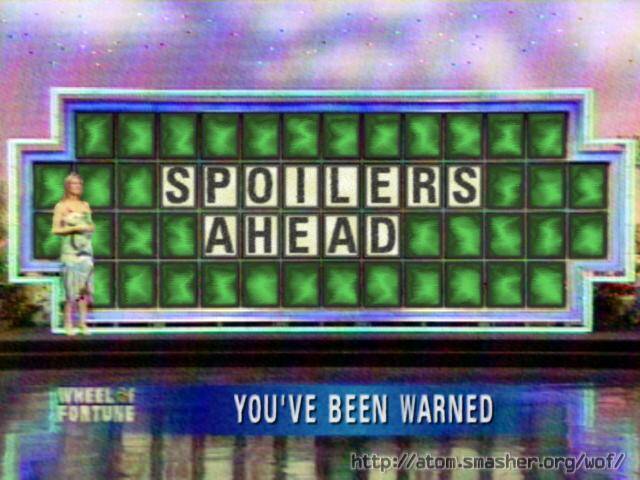Writers often hear that they should read good writing in order to improve at their craft. I’ve gone over how that applies to visual storytelling as well by looking at a bad example of using tropes, and contrasting good and bad examples of how the overall structure changes the story. To wrap up, I’m going to look at the finale of The Expanse, and how it did adaptation right and how that helps you think better about your writing.
Also – and to serve as spoiler space – the Kickstarter for That Which Cannot Be Undone: An Ohio Horror Anthology ends on 28 January. The anthology is scheduled for October 2022 and will include twenty stories from me and other Ohio authors such as Lucy Snyder, Tim Waggoner, Megan Hart, Gary A. Braunbeck, and Gwendolyn Kiste. Check it out and back the antho at:
https://www.kickstarter.com/projects/crackedskullproject1/that-which-cannot-be-undone-an-ohio-horror-anthology

I really adore The Expanse. It – both as book and TV series – is hard enough scifi that space combat is actually realistic, space and travel in it is inherently dangerous, there’s only really one major element of (human-based) handwavium – the Epstein Drive – and the rest of it is explicitly in the realm of Clarke’s third law. And yet, The Expanse is "soft" enough sci-fi that the sociology/political science parts completely track, and the characters are fully formed and fleshed out individuals with inner lives that matter.
The final book of The Expanse was released at the end of last year, and the TV series – after jumping from SyFy to Amazon – just had its series wrap release. There’s some important lessons to learn from the difference between the books and the TV series and how well that was handled, particularly in comparison to the widely-panned way the last season of Game of Thrones went.
Spoilers, of course.
The Expanse had a different problem than GoT: They had to end the TV series about where book six (Babylon’s Ashes) ends, with some additional material from the novella Strange Dogs added in. The book series ends with book nine (which I’m about to start reading today).
Yet unlike many GoT fans, I feel satisfied with how The Expanse ended its TV series, plus how it left room for either fans to explore the books and for there to be #andamovie in the future.
There were rewrites and edits throughout the series, of course.
Some characters had their personalities tweaked. The first I noted was how James Holden’s role in the solar system politics is de-emphasized a bit. In written fiction, having a very central POV character to hold onto when you have a large ensemble cast, especially when you’re still being introduced to them, can be very useful. Holden is still our original POV character, but the visual distinctiveness of the other characters over the course of the series allow it to be more egalitarian and not hold quite so tightly to our original POV character.
There were significant rewrites due to real-world issues as well. One actor had his #metoo movement and left the show, resulting in a major character suddenly dying at a point where they are alive in the books. This was actually pretty easy for the writers to handle, as they’d already clearly established the dangers of space travel, particularly at high G forces.
But the resolution of the TV series… well, it’s significantly different than how things went in the books, and yet I’m completely satisfied because of the structure of the work.
The television series ends on a much more upbeat and hopeful tone than where the books are at that point. As I remember it, at the end of Babylon’s Ashes there is very much the same feel as there is at the end of The Empire Strikes Back. The victory and resolution at the end of the book is not an unmitigated one, directly leading into the next iteration of social and personal challenges in the book series. In the television series, the main characters manage to just straight-up pull it all off. There are costs, yes (Drummer’s sacrifices hit much harder in the show, IMHO), but it felt more hopeful and optimistic.
That’s totally appropriate for a series that has faced cancellation several times and yet managed to tell its story right up to a natural stopping point. Characters have had their arcs fulfilled (more on this in a second), and where changes have occurred, they make sense. They’re things that could have happened in the books just as depicted in the screen, but went a bit differently instead. This in contrast to the very, very drastic changes in Daenerys Targaryen that left viewers puzzled.
Despite the more hopeful tone in the TV series, the groundwork has been firmly laid for the problems the main characters encounter in the later books. Of particular note to writers is the way that the elements of Strange Dogs was added to this series. The story of the novella is largely told in the prologue portion of each episode of season 6, and entirely takes place on Laconia, far away from the A (and B, and C) plot of season 6. Keeping these elements – and putting them (almost entirely) apart from the rest of the story – was a stroke of screenwriting genius.
While the events of Strange Dogs do not have a direct payoff for the rest of the story in the Sol system, it serves two roles in the TV series. First, it helps tie the entire thing together. The protomolecule was the thing in earlier seasons. Season 6 focuses on non-protomolecule related events in Sol system, so its inclusion helps tie the entire TV series together as a coherent whole. But it also – particularly in the timing of how it is presented.
Laconia system – and Duarte – have a huge impact on how things go at the culmination of this series. But that is a lot of material to go into. If they’d tried to unpack that, it would run the risk of making the same mistake that Eternals did. So instead, we only briefly get Duarte showing up at/after the big reveal from Strange Dogs and with another character mentioning they succeeded with something with the protomolecule. We see Duarte with a smug and contemplative look; it is clear that this is a huge positive development for him in just a few seconds of screen time.
And so, when Marcos Inaros (our antagonist/BBEG) requests Duarte’s aid, it completely makes sense that Duarte goes "Yeah, nah, brah." We understand from just the short sequence of prologues and a few moments of screen time that Duarte now thinks he is in a position where Marcos is an unneeded liability. It does not feel like a deus ex machina; instead, it’s a cold, rational decision that informs us about the character of Duarte and his relationship with Marcos.
There are also fan-service moments that are done quite well – particularly allusions to some very notable events for characters later on in the books. These powerful character moments are moved ahead of the timeline of the books (and changed somewhat), but are effectively the same kind of situation that occurs in the book series. Specifically, Bobbie Draper’s sacrifice in Tiamat’s Wrath now occurs in the assault on the Ring Station. Unlike most fan-service, it doesn’t feel like fan-service for one simple reason: It is the completion of Bobbie Draper’s character arc, where she has fully shifted from blind loyalty to the MCRN to loyalty to her chosen family and their cause, and is at peace with that. That’s also why the change in the aftermath of that arc does not bother me in the slightest, because her actions are what completes her character arc, not the outcome of that action.
Even with the changes to Alex Kamal’s story required by real-world events were handled after a point where his character arc had, if not completed, tied up his current emotional conflict with his ex-wife.
Again, contrast that to the changes made to Daenerys Targaryen in GoT, where even my second-hand knowledge of the character resulted in me reading a synopsis of what happened in the TV show and saying "She did what?".
As a writer, these are the kinds of things to pay attention to when you’re consuming stories. What works. What doesn’t. Pay attention to how the writers complete character arcs. Pay attention when they don’t. Seeing how it is done (and what not to do) will help improve your own writing.
Thanks for reading, and don’t forget the Kickstarter for That Which Cannot Be Undone: An Ohio Horror Anthology ending on 28 January. Check it out and back the book at:
https://www.kickstarter.com/projects/crackedskullproject1/that-which-cannot-be-undone-an-ohio-horror-anthology
Featured Photo by Diego González on Unsplash

I already miss the Expanse, although I do feel some sense of completion after the finale. Your analysis here from the perspective of a writer and someone with a more learned understanding of literature than I have adds much to my appreciation for the show; thank you. The significance of what was happening on Laconia I admit was evading me to some degree, because I neglected consideration for the science fiction versus what I found so compelling anthropologically and psychologically in the stories. A tip of my Shapu for your post, Kopeng.